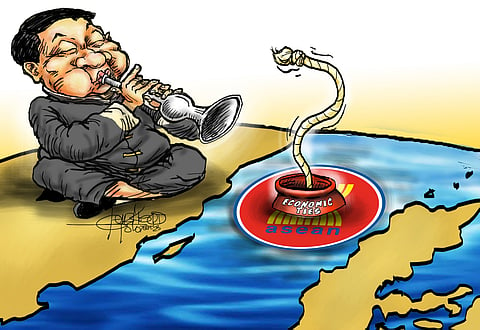
- NEWS
- the EDIT
- COMMENTARY
- BUSINESS
- LIFE
- SHOW
- ACTION
- GLOBAL GOALS
- SNAPS
- DYARYO TIRADA
- MORE

As Southeast Asian leaders gather in Jakarta for their regional summit, fears have been raised over the bloc getting dragged into big-power rivalry as they seek to dispel worries about rifts over peace efforts in Myanmar and to reaffirm the relevance of their disparate group.
No less than Indonesian President Joko Widodo, opening the summit of the 10-member Association of Southeast Asian Nations Tuesday called on the members to devise a "long-term tactical strategy that is relevant and meets people's expectations."
He said ASEAN has agreed not to be a proxy for any powers.
"Don't turn our ship into an arena for rivalry that is destructive," he warned in his opening remarks.
Founded at the height of the Cold War in the 1960s to oppose the spread of communism, the politically diverse grouping prioritizes unity and non-interference in members' internal affairs.
But that is easier said than done.
While they may be too concerned over rifts in the peace efforts in Myanmar, a bigger problem, probably as big as the South China Sea, looms over their heads.
The disputed waterway, a region rich in resources and of strategic importance, has been a focal point of tension and disputes among various nations for decades. In the event of conflict erupting in the South China Sea, ASEAN will find itself facing complex challenges and crucial decisions.
Before delving into ASEAN's role in a potential South China Sea conflict, it is essential to understand the complexities of the disputes in the region.
Multiple claimants, including China, Vietnam, the Philippines, Malaysia, Brunei and Taiwan, assert sovereignty over various islands, reefs, and waters in the South China Sea. These overlapping territorial claims have created an atmosphere of tension, with incidents of naval confrontations, militarization of islands, and increased military presence.
While several attempts have been made to address these disputes through diplomatic means, the situation remains precarious.
ASEAN's core principles include the promotion of peace, stability, and prosperity in the region through diplomatic dialogue, non-interference in internal affairs, and consensus-based decision-making.
The regional bloc has demonstrated a commitment to the peaceful resolution of conflicts. The 2002 ASEAN-China Declaration on the Conduct of Parties in the South China Sea or DOC and subsequent efforts to negotiate a legally binding Code of Conduct or CoC with China reflect this commitment.
ASEAN's role, therefore, is primarily that of a mediator and facilitator of negotiations aimed at reducing tensions and preventing the escalation of conflicts.
But what if a conflict erupts in the South China Sea?
Would ASEAN uphold its fundamental principles, particularly the peaceful resolution of disputes, to prevent the outbreak of full-scale hostilities?
Would it engage in shuttle diplomacy, urging all parties to exercise restraint and explore diplomatic solutions?
This is where ASEAN's role as a platform for regional dialogue becomes crucial. It should intensify diplomatic efforts to facilitate negotiations between the involved parties. This can include organizing summits, dialogues, and confidence-building measures to foster an environment conducive to resolving disputes peacefully.
Furthermore, ASEAN should encourage adherence to international law, particularly the United Nations Convention on the Law of the Sea or UNCLOS. By promoting respect for international norms, ASEAN can help maintain order and deter any unilateral actions that could lead to a military confrontation.
While ASEAN has the potential to play a constructive role in mitigating conflict, several challenges could hinder its effectiveness.
One such challenge is the divergent interests and allegiances among ASEAN member states. Some nations may be more inclined to side with external powers, like the United States or China, depending on their strategic interests and alliances. Maintaining ASEAN's unity in the face of external pressures will be a considerable challenge.
Another challenge is the historical reluctance of some ASEAN members to confront China directly due to economic ties or political considerations. Balancing economic interests with regional security concerns will require skillful diplomacy and could strain ASEAN's cohesion.
Moreover, the absence of a legally binding CoC in the South China Sea complicates ASEAN's efforts to manage conflicts. The negotiations for such an agreement have been protracted, and there is no guarantee of a successful outcome. ASEAN must navigate these challenges while advocating for a peaceful resolution.
In the event of conflict in the South China Sea, therefore, ASEAN's role would be pivotal in preventing further escalation and facilitating a peaceful resolution.
Unless it wants to erase its image as a mere talk shop, the regional bloc should address this issue now while there is time.
Otherwise, it might be too late.
